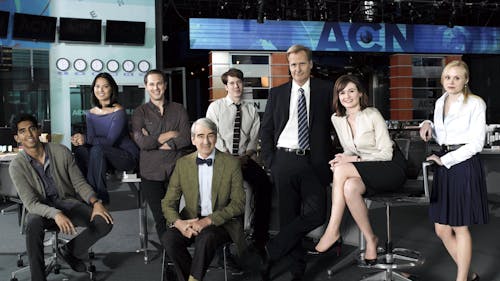'The Newsroom' show has eerie parallels to 2021 America

The news that has been published since the beginning of the new year: the riots at the Capitol, Earth’s nearly hottest year on record and the war on information/disinformation, just to name a few headlines. It would’ve been so interesting to see it all reinterpreted and conveyed by Aaron Sorkin, show writer and director of “The Newsroom."
“The Newsroom,” an HBO series that first aired in 2012, is a political drama that revolves around the fictional modern-day cable broadcast network, Atlantis Cable News (ACN) and its featuring primetime anchor of “News Night,” Will McAvoy, played by Jeff Daniels, along with his executive producer MacKenzie McHale, played by Emily Mortimer, and their related associate producers Jim Harper, played by John Gallagher Jr. and Maggie Jordan, played by Alison Pill.
The cast also features Olivia Munn as Sloan Sabbith, a senior economics reporter, and Thomas Sadoski as Don Keefer, the executive producer of the 10 p.m. show.
Curious about the work that goes into producing a nightly news show? Want to know how to compress a comprehensive report of the breaking news events that have happened around the globe in the last 24 hours into a short, 1-hour segment? Then be prepared to know all you have ever wanted to and even more than you thought possible.
In fact, when writing the show, Sorkin pulled actual events that were being reported on between the 2010 and 2013 period and featured McAvoy as the head of his altruistic mission to sincerely report the news instead of worrying whether doing so will offend someone.
This cast, combined with their deliciously epic chemistry, provided me more than enough incentive to binge all three seasons, 25 episodes, in the span of three days. Not to mention, the amazing dialogue that keeps you engaged through the loops and turns of reporting on the tragedies and calamities I once lived through.
Nevertheless, the main reason I still think about this show is that, even though this show is now more than 6 years old, I find that it holds so many parallels to today’s society. What Sorkin saw in 2012 was a reflection of both the past and the future of American democracy and media. Hopefully, he left us some clues as to how to get out of this mess.
Terrorism is terrorism is terrorism
“They can call themselves the Tea Party. They can call themselves conservatives, and they can even call themselves Republicans, though Republicans certainly shouldn't. But we should call them what they are. The American Taliban,” McAvoy said in the finale episode of season one.
The particular context surrounding this scene is when McAvoy does deeper research into the Tea Party, a “conservative populist social and political movement that emerged in 2009” that quickly garnered national approval, and realized that these “Republicans” were much more dangerous in their denial of science and facts than just for their ideology.
In the show, McAvoy had the audacity to refer to them as what they really are, which are terrorists. But six years later, and we still can’t seem to get the courage to do just that to the people who claim to be Republicans themselves. After the Jan. 6 riots, there was a lot of debate on what to call the people who invaded the Capitol.
A terrorist, what the Taliban consists of, is defined as “a person who uses unlawful violence and intimidation, especially against civilians, in the pursuit of political aims,” according to Oxford Dictionary. The fundamentalist beliefs of the Tea Party back in 2012 and the actions of the Capitol protesters seem to fit this definition pretty well.
“The terrorist label has been used against Black and Muslim-identified Americans as an excuse to surveil and criminalize those communities,” said Melina Abdullah, a Black Lives Matter organizer and protestor, according to NPR. “While what she calls 'white supremacist terrorists' are organizing coup attempts on social media platforms with few repercussions.”
Words do matter and labeling these terrorists is a good start to change, but an even better one might be what McAvoy said at the end of his segment, “The American Taliban cannot survive if Dorothy Cooper is allowed to vote.”
Dorothy Cooper was a 96-year-old resident in Chattanooga, Tennessee, who could not vote because she did not possess a driver’s license. If we protect the people who should be rightfully allowed to vote by getting rid of unnecessarily restrictive voter registration laws, something we focused on in 2020, we can see real change in the electorate. A change that we need to continue to cultivate.
A well-informed electorate
“We must reject a culture in which facts themselves are manipulated and even manufactured,” said President Joseph R. Biden Jr. in his inaugural address. I seemed to recall these same words spoken once with only slightly different packaging.
“There’s nothing that’s more important in a democracy than a well-informed electorate … When there’s no information, or much worse, wrong information, it can lead to calamitous decisions and clobber any attempts at vigorous debate. That’s why I produce the news,” McHale said in episode one of “The Newsroom.”
I guess we've gone full circle. In 2016, the questioning of facts and truth got us an elected president who continued to deny these two terms were immutable. In 2020, we saw our nation torn apart by facts and truth. We still have a long way to go, but maybe having our president echo the words of a fictional executive producer with stars in her eyes is a step forward in the right direction.
To be fair, there are a lot of complaints about Sorkin’s preachy, holier-than-thou show, mostly along the lines of “too many monologues” or that the show is simply “too idealistic,” ignoring reality for the sake of the message itself.
Sorkin himself said, “I didn't feel safe making up news. I didn't think it would be real. I didn't want it to be silly. It was just meant to show people putting on the news in a world where doing the news and profit concerns are always competing."
Unfortunately, that seemed to make the journalists critiquing his show offended by how they perceived Sorkin was trying to tell them how to do their jobs.
Yet, I don’t think that was really the case. Maybe it’s because I am years removed from the actual events covered in the show, or maybe because I’m not actually in a newsroom myself, but I actually genuinely enjoyed hearing what Sorkin thought should be said in the news.
Sure, it’s idealistic and, at times, so far-fetched as to be fantastical, but it’s also an ideal to strive for. It’s a moral guide to check ourselves and actually listen to the people who hold the facts and find a way to trust them once more in delivering us the news.



